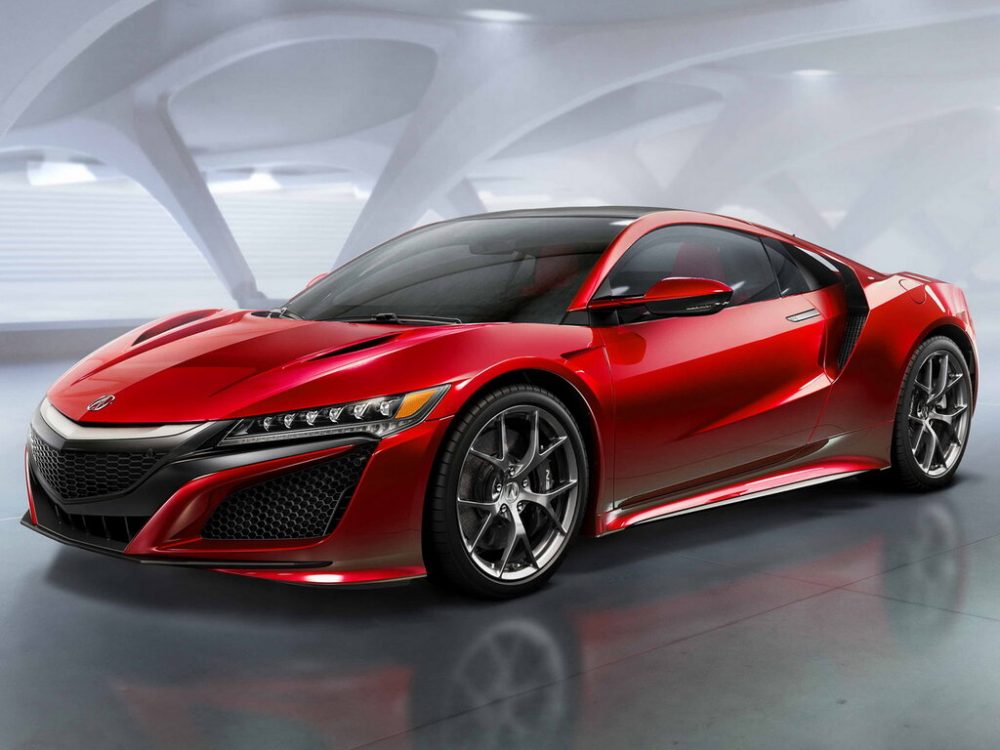The Acura NSX sits in a rare space where raw power meets cutting-edge electrification. Born from Honda’s racing heritage, this hybrid supercar proves that the future of performance isn’t just about big engines and loud exhausts. The second-generation NSX takes the original’s groundbreaking formula and adds a dose of 21st-century innovation.
Japanese engineering prowess meets Silicon Valley thinking in this technological tour de force. With three electric motors complementing its twin-turbo V6, the NSX represents a different kind of supercar – one that embraces complexity in pursuit of performance.
The Heart(s) of the Matter
The NSX’s powertrain reads like a spec sheet from the future. A 3.5-liter twin-turbocharged V6 engine works in harmony with a trio of electric motors, creating a symphony of mechanical and electrical power. This combination delivers 573 horsepower to all four wheels through a lightning-quick 9-speed dual-clutch transmission.
Each front wheel gets its own electric motor, enabling precise torque vectoring that helps the car rotate through corners with supernatural agility. A third electric motor sits between the engine and transmission, filling in power gaps and ensuring immediate response to throttle inputs.
“After tracking the NSX for six months, I’m still amazed by how it combines raw power with surgical precision. The instant torque from the electric motors makes it feel like it’s reading my mind.” – Mark Davidson, Professional Driver
The hybrid system doesn’t just add power – it transforms the driving experience. At low speeds, the NSX can creep silently on electric power alone, making it surprisingly civilized for urban driving. Push the throttle, and the V6 roars to life, working in perfect harmony with the electric motors.
Daily Driver or Track Weapon?
The NSX demolishes the old compromise between performance and practicality. Its adaptive suspension can transform from track-ready firm to surprisingly compliant at the touch of a button. The cabin offers genuine comfort for long drives, though storage space remains typically supercar-modest.
The driving modes significantly alter the car’s personality:
- quiet mode enables pure electric operation for neighborhood cruising;
- sport mode balances performance with daily usability;
- sport+ sharpens responses for spirited driving;
- track mode unleashes the full potential of the hybrid powertrain.
This versatility makes the NSX uniquely suited for both weekend track days and mundane Monday commutes.
Technical Mastery
The body structure tells a story of obsessive engineering. Aluminum and carbon fiber work together in a space frame design that provides exceptional rigidity while keeping weight manageable. Despite carrying a heavy hybrid system, the NSX tips the scales at a reasonable 3,803 pounds.
“After 20 years of reviewing supercars, the NSX’s chassis tuning stands out. The way it masks its weight through corners defies physics.” – Sarah Chen, Automotive Engineer
The aerodynamics are equally sophisticated, with carefully sculpted channels directing air to cool the brakes and power units. Six different heat exchangers manage temperatures across the complex powertrain, ensuring consistent performance even under extreme conditions.
Performance Without Compromise
The numbers tell an impressive story: 0-60 mph in under 3 seconds, a top speed exceeding 191 mph. But these figures only hint at the NSX’s true capability. The instantaneous torque from the electric motors means throttle response is immediate, regardless of engine speed.
Track testing reveals these key performance highlights:
- quarter-mile time of 11.2 seconds;
- lateral grip exceeding 1.0 g;
- 60-0 mph braking distance of 97 feet;
- seamless power delivery throughout the rev range.
This combination of capabilities puts the NSX in rare company, competing with supercars costing significantly more.
A New Path Forward
The NSX demonstrates that hybrid technology isn’t just about fuel economy – it’s about enhancing performance in ways traditional powertrains cannot. While purists might miss the raw mechanical feel of the original NSX, this new iteration charts a bold course toward the future of high-performance vehicles.
| Pros | Cons |
|---|---|
| Instantaneous torque from electric motors | Complex powertrain may concern long-term reliability |
| Exceptional handling and balance | Limited storage space for a daily driver |
| Multiple driving modes for various conditions | Less dramatic engine sound than traditional supercars |
| Comfortable enough for daily use | Higher maintenance costs due to hybrid complexity |
| Advanced torque vectoring system | Polarizing exterior design |
| Excellent build quality | Limited production numbers affect parts availability |
| Revolutionary hybrid technology | Higher initial cost compared to some competitors |
The second-generation NSX may not please traditional supercar purists, but it successfully reimagines what a high-performance vehicle can be. It combines everyday usability with genuine supercar performance, all while showcasing hybrid technology’s potential for enhancing rather than compromising the driving experience.

